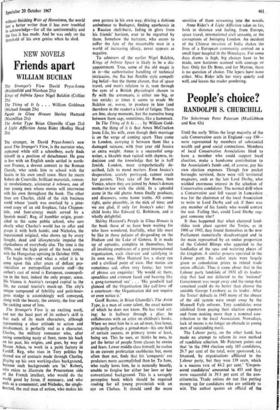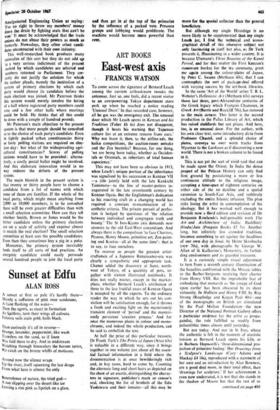People's choice?
RANDOLPH S. CHURCHILL
The Selectorate Peter Paterson (MacGibbon and Kee 42s)
Until the early 'fifties the large majority of the safe Conservative seats in England—say 150—
were represented by members of substantial wealth and good social connections. Members of local Conservative Associations liked to have a member who could support local charities, make a handsome contribution to the Association's funds and, of course, pay his own election expenses. Though few pocket boroughs survived, there were still territorial magnates, such as the late Lord Derby, who wielded enormous interest in the selection of Conservative candidates. The normal drill when a Conservative seat fell vacant in Lancashire was for the chairman of the local Association to write to Lord Derby and ask if there was any member of his family who would contest the seat. Failing that, could Lord Derby sug- gest someone else?
It thus happened that when electoral land- slides took place against the Tories, as in 1906 or 1945, they found themselves in the new Parliament numerically disadvantaged and in the main represented by an undue proportion of the Colonel Blimps who appealed to the landladies of the spas and watering places of the kingdom. A similar process operated in the Labour party. Its safest seats were largely given as consolation prizes to retired trade union officials. Thus it came about that in the Labour party landslide of 1931 all its leader- ship that had not defected to the 'national' Government was swept away and the rump that remained could do no better than choose the amiable George Lansbury as its leader. After the Tories' debacle in 1945 many of the abuses of the old system were swept away by the Maxwell Fyfe reforms. Tory candidates were inhibited from paying their election expenses and from making more than a nominal con- tribution to the local Association. Nowadays, lack of means is no longer an obstacle to young men of outstanding merit.
The Labour party, on the other hand, has made no attempt to reform its own method of candidate selection. Mr Paterson points out that 'in the 1964 election only 165 candidates, 26.7 per cent of the total, were sponsored, i.e. financed, by organisations affiliated to the Labour party, but they won 139 seats, which is a success rate of 84.2 per cent.' Unspon- sored candidates' amounted to 453 and they were successful in 39.3 per cent of the con- stituencies. Trade unions do not like putting money up for candidates who are unlikely to win. The author quotes an official of the Amalgamated Engineering Unit. nt as saying: Tve no right to throw my members money down the drain by fighting seats that can't be woo,' It must be acknowledged that the trade onions do not abuse their powers as much as formerly. Nowadays, they often select candi- dates unconnected with their own industry.
This well-researched book produces many anomalies of this sort but they do not add up to a very serious indictment of the present method by which candidates are selected and members returned to Parliament. They cer- tainly do not justify the solution for which the author pleads, namely the institution of a system of primary elections by which each party would choose its candidate before the main election was joined. Mr Paterson thinks this system would merely involve the hiring of a hall where registered party members could vote and a few other halls where meetings could be held. He thinks that all this could be done with a couple of hundred pounds.
Mr Paterson's main objection to the present system is that more people should be consulted as to the choice of each party's candidate. Even in tightly packed urban constituencies thirty or forty polling stations are required on elec- tion day: but what of the widespreading agri- cultural constituencies? Scores of polling stations would, have to be provided: alterna- tively, a costly postal ballot might be involved. And this elaborate innovation would in no way redeem the defects of the present system.
The main blemish in the present system is that twenty or thirty people have to choose a candidate from a list of names with which none of them are familiar. -If the whole of the local party, which might mean anything from 2,000 to 10,000 members, is to be consulted there will be even greater difficulties than with a small selection committee. How can they tell whether Smith, Brown or Jones would be the better candidate unless the primary elections are on a scale of activity and expense almost to match the real election? The small selection committee at least sees the possible candidates. Even then They sometimes buy a pig in a poke.
Moreoirer, the primary system inevitably lends itself to all sorts of bad practices. An energetic candidate could easily persuade several hundred people to join the local party
and then get in at the top of the primaries by the influence of a packed vote. Pressure groups and lobbying would proliferate. The machine would become more powerful than ever.



































 Previous page
Previous page